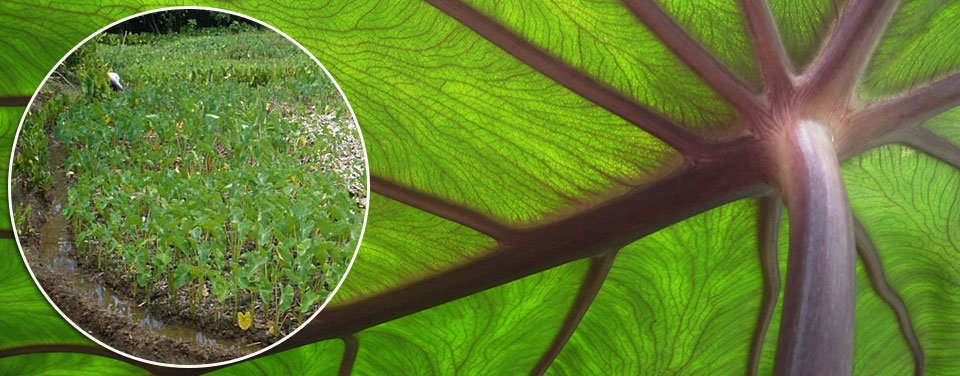Traditional Palauan Agriculture Supports Healthy Coral Reefs
NOAA-funded study reveals that taro fields can trap up to 90 percent of sediments.

Taro Power!
Traditional Palauan taro fields act as natural sediment traps that protect the Pacific island nation's coral reefs. Inset image credit: Faustina K. Rehuher-Marugg
Photo credit - Avenue | Wikimedia Commons | Used under the Creative Commons Attribution-Share Alike 3.0 Unported | Modifications: size, image-in-image
The coral reefs of Palau—an island nation in the western Pacific Ocean—are threatened by sedimentation resulting from land clearing in watersheds. A new study funded by NOAA confirms what Palauans have known for millennia: that cultivated wetlands, in particular taro (Colocasia esculenta) fields, can control soil erosion and reduce the impact of runoff on to near-shore coral reefs.
Palauans traditionally have survived by balancing population growth and development with sustainable agriculture and fishing practices. However, some communities are experiencing the negative effects of increased coastal development and a movement away from the domestic production of taro, a starchy root vegetable common in the native Palauan diet. Land clearing, agriculture, and development have damaged coral reefs by introducing nutrient runoff from fertilizers, human-derived sewage, sedimentation, and coastal pollution, and by reducing the amount of light available for photosynthesis.
Taro fields in Palau are designed with embankments that allow a steady flow of water through the fields, using the taro plants as natural sediment traps. The NOAA-funded study revealed that taro fields can trap up to 90 percent of sediments. The island's mangrove forests also trap runoff, so preserving them is essential. Another benefit of reinvigorating fallow taro fields to control runoff is to lessen Palau's reliance on imported rice. Together, these simple solutions can greatly reduce runoff onto coral reefs.
Get Social
More Information
Did you know?
Runoff, sedimentation, and non-point source pollution are among the greatest threats to reefs and reef fisheries throughout the Pacific Basin. Learn more
